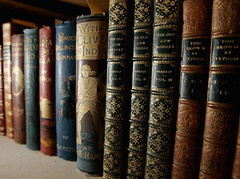
PREV ARTICLE
NEXT ARTICLE
FULL ISSUE
PREV FULL ISSUE
GOOGLE BOOKS TOOL TRACKS WORD USE OVER THE CENTURIES
This week National Public Radio aired a segment about a new research tool from Google. For the curious word-o-phile it looks likes lots of fun, but perhaps there are uses in numismatic research as well.
-Editor
The words make up a searchable database that researchers at Harvard say is a new and powerful tool to study cultural change. The words are a product of Google's book-scanning project. The company has converted approximately 15 million books so far into electronic documents. That's about 15 percent of all books ever published. It includes books published in English, Spanish, French, German, Chinese, Russian and Hebrew. Many of these books are covered by copyright, and publishers aren't letting people read them online. But the new database gets around that problem: It's just a collection of words and phrases, stripped of all context except the date in which they appeared. Yet Erez Lieberman Aiden, a mathematician and bioengineer at Harvard and co-creator of this new database, says it opens the door to a whole new style of literary scholarship. "Instead of saying, 'What insight can I glean if I have one short text in front of me?' — it's, 'What insight can I glean if I have 500 billion words in front of me; if I have such a large collection of texts that you could never read it in a thousand lifetimes?' " You can, for instance, type in a word or a short phrase, and the database produces a graph — a curve that traces how often an author used those words every year since 1800. "And you realize that it's fantastically addictive," says Jean-Baptiste Michel, a mathematician and biologist at Harvard who created the new database together with Aiden. "You can just spend hours and hours typing in the names of people you know, places you like, or just random stuff. And so you end up discovering quite a lot of things that way."
Katie Jaeger found a story in the Chronicle of Higher Education, noting "I think the pursuit is fascinating but "Culturomics" is a lousy name for it! And maybe some people are forgetting our history, but certainly not numismatists."
-Editor
To read the complete article, see: Scholars Elicit a 'Cultural Genome' From 5.2 Million Google-Digitized Books (chronicle.com/article/Scholars-Elicit-a-Cultural/125731/)
For fun, here's the frequency some numismatic words over the centuries: coin, medal, token, banknote, scrip.
-Editor

To read the complete article, see:
Google Book Tool Tracks Cultural Change With Words
(www.npr.org/2010/12/16/132106374/google-book The Numismatic Bibliomania Society is a non-profit organization promoting numismatic literature. See our web site at coinbooks.org. To submit items for publication in The E-Sylum, write to the Editor at this address: whomren@gmail.com To subscribe go to: https://my.binhost.com/lists/listinfo/esylum All Rights Reserved. NBS Home Page Contact the NBS webmaster 
|
